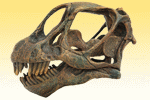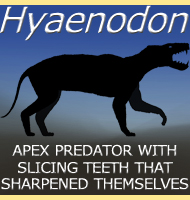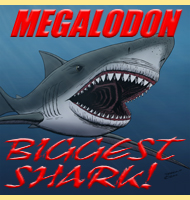


Georgiacetus
Name:
Georgiacetus
(Georgia whale).
Phonetic: Jor-jah-see-tus.
Named By: R. C. Hulbert, R. M. Petkewich,
G. A. Bishop, D. Bukry & D. P. Aleshire -
1998.
Classification: Chordata, Mammalia, Cetacea,
Archaeoceti, Protocetidae.
Species: G. vogtlensis
(type).
Diet: Carnivore.
Size: Skull 76 centimetres long. Total length
roughly estimated to be about 3 meters long.
Known locations: USA, Alabama Georgia and
Mississippi.
Time period: Bartonian of the Eocene.
Fossil representation: Skull, mandible as well as
partial post cranial remains.
Georgiacetus
is one of the most primitive whale genera to be discovered in the
United States, with the holotype fossils discovered in the state of
Georgia during the construction of a nuclear power station. New
fossil material discovered in 2008 resulted in confirmation that
Georgiacetus did not have a fluked tail like modern
whale forms. This
also means that Georgiacetus would have primarily
swum with a
combination of undulating the hips and trunk with the rear legs used
for additional propulsion.
This
in turn has caused a little bit of upset with traditional evolutionary
models which had whales evolving in Asia, and then developing tail
flukes which allowed them to cross oceans into new territories. The
presence of Georgiacetus, without a tail fluke in
North America
proves that this was not entirely the case. However, this does not
completely discount the idea of an Asian origin for whales, early
populations were best adapted for coastal swimming anyway, and they
could have spread across to North America simply by hugging the coast
lines of India, China, and Russia, before passing along
Beringia. Beringia is the name of the land bridge that once connected
Eurasia and North America that allowed faunal exchanges to take place
for tens of millions of years, but today this has been submerged to
form the Bering Strait. It should also be remembered that during the
Eocene North and South America were separated, and that once
primitive whales reached Southern Mexico they would be able to keep
swimming along to colonise the southern and eastern coastlines of North
America.
Further reading
- A new middle Eocene protocetid whale (Mammalia: Cetacea:
Archaeoceti) and associated biota from Georgia. - Journal of
Paleontology 72(5):907-927. - R. C. Hulbert, R. M.
Petkewich, G. A. Bishop, D. Bukry & D. P.
Aleshire - 1998.
- New Protocetid Whales from Alabama and Mississippi, and a New
Cetacean Clade, Pelagiceti. - Journal of Vertebrate Paleontology
28 (3): 589–593. - Mark D. Uhen - 2008.
Random favourites
 |
 |
 |
 |




